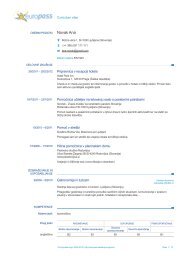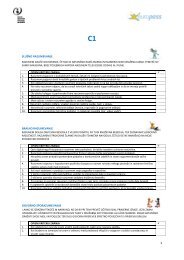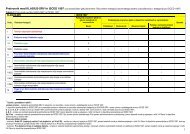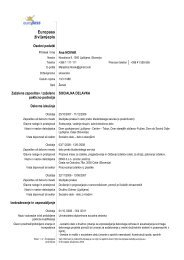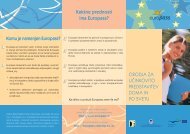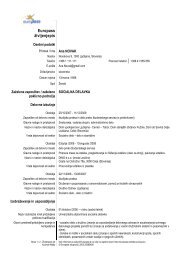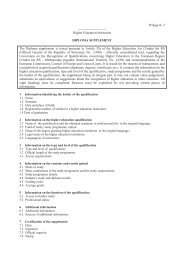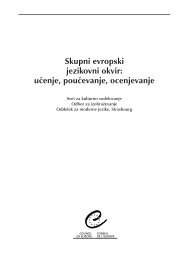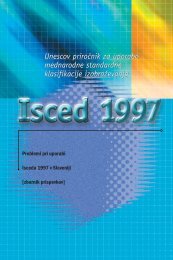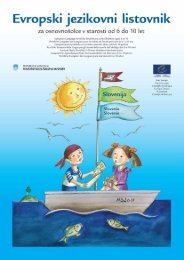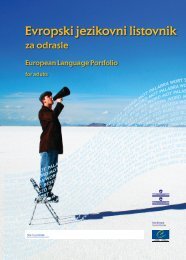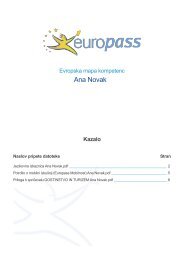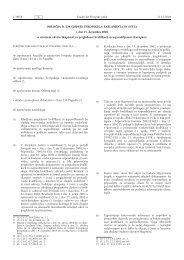Download - Europass
Download - Europass
Download - Europass
Create successful ePaper yourself
Turn your PDF publications into a flip-book with our unique Google optimized e-Paper software.
Exploring synergies between European tools:<br />
Survey on PLOTEUS and EQF Portals<br />
The recent external periodic evaluation of <strong>Europass</strong> concluded, inter alia, that “better convergence could be sought between <strong>Europass</strong>,<br />
EURES, EQF, ESCO and other relevant portals (e.g. PLOTEUS - The Portal on learning opportunities throughout the European space)<br />
for the users to access all useful tools related to their transparency and mobility needs through a one-stop shop,” (see page 2 above).<br />
To explore the usability of related European information services, the European Commission, Directorate General for Education and<br />
Culture recently commissioned a survey on user consultation of the PLOTEUS and the EQF Portal. 3s Unternehmensberatung, together<br />
with ICF GHK, are conducting the survey asking current and potential users about their information needs and satisfaction with the<br />
portals. Questions are asked about the information and services provided by the portals, about the usability and functionality of the<br />
websites, and the options for future developments.<br />
The purpose of the survey is to collect the users’ views on the EQF Portal – a platform that brings together information on the<br />
implementation of the European Qualifications Framework (EQF) and how member states have linked their qualifications to this<br />
common framework – and on PLOTEUS, which aims to help students, job seekers, workers, parents, guidance counsellors and<br />
teachers to find information about studying in Europe. The results of the questionnaires will contribute to improving and further<br />
developing the PLOTEUS and EQF portals towards better functionality and cooperation between related European tools and initiatives.<br />
If you would like to participate in the survey for the EQF portal, please follow this link: EQF. For the survey on PLOTEUS, please click<br />
at PLOTEUS. The questionnaires are available in English, French, German, Italian, Portuguese and Spanish, and the surveys are online<br />
from 20 March until the end of April 2013.<br />
If you have any questions with regard to the survey, please do not hesitate to contact the project manager at ziegler@3s.co.at.<br />
Petra Ziegler | 3s Unternehmensberatung GmbH, Vienna<br />
Make your CV work!<br />
Hungarian NEC surveys employers’ views on the <strong>Europass</strong> CV<br />
The National <strong>Europass</strong> Centre Hungary launched a survey in the autumn 2012 about the reputation and the usage of the <strong>Europass</strong> CV<br />
from the employers’ point of view. HR specialists in different companies were asked, involving various sectors and company sizes from<br />
SMEs to multinationals. Altogether, 62 companies replied. 98% of the respondents were familiar with the <strong>Europass</strong> CV format even<br />
though they were not asking for it specifically when recruiting new workers.<br />
On average, 42% of the CVs received by companies were in the <strong>Europass</strong><br />
format, and based on the experience of the HR specialists the tendency is<br />
increasing. Almost 60% of the companies liked the format.<br />
The survey also asked the respondents about specific pros and cons of the<br />
<strong>Europass</strong> CV. They mostly felt positively about the structure which helps jobseekers<br />
not to leave out any important information. As for the challenges with<br />
the format, the following views were recorded: the language reference system<br />
might be too complicated for some companies; the level of detail in the CV is<br />
high, which can make the document too long; the standardised structure may<br />
sideline users’ individual input.<br />
Another section of the survey dealt with typical mistakes made in CVs. It was<br />
confirmed that the <strong>Europass</strong> format was effective in supporting a comprehensive information value of CVs. The format also ensures<br />
that the level of language knowledge is included, and that previous work experience is described with the relevant information on<br />
activities and responsibilities. More than a half of the HR specialists affirmed that the personal skills and competences section is a good<br />
source of topics for personal interviews. However, another 40% of the respondents warned against filling this section with general<br />
stereotypes such as “good team-player”.<br />
As regards HR specialists’ recommendations for the future development of the <strong>Europass</strong> CV, they would welcome more examples of<br />
completed CVs on the <strong>Europass</strong> websites, as well as increasing the flexibility of the format. The respondents supported putting the<br />
name of the employer before main tasks and responsibilities in the work experience section: one of the changes brought about by the<br />
new <strong>Europass</strong> CV. More orientation on work results within the description of experience was recommended, as were more individual<br />
focus and precision in filling personal skills and competences.<br />
These statements and results refer to the old format of the <strong>Europass</strong> CV as the survey was conducted in the autumn 2012. It will be<br />
interesting to launch another survey about the new CV format, and to explore how the changes are perceived by employers.<br />
Csilla Szabo | Tempus Public Foundation / NEC Hungary<br />
Lessons from the Hungarian employer survey:<br />
• The <strong>Europass</strong> CV structure will inspire you. It<br />
will also help you organise your inspiration.<br />
• Choose appropriate level of detail. Keep your<br />
CV to-the-point and accurate.<br />
• Beware of general phrases and stereotypes.<br />
• Make sure to promote concrete outcomes of<br />
your work or study.<br />
• Give the reader something they will want to<br />
hear more about in an interview.<br />
• Be you. That’s who gets the job.<br />
<strong>Europass</strong> Newsletter Nr. 4 | April 2013 | ISSN 2305-1779<br />
11



